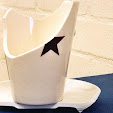I painted a lot when I was a boy. I have always used photography. When I was seven, I was given a simple camera. I would get my friends to pose in pretend fights or group bicycle crashes and then capture the contrived looking scenes. Capturing single frames from a situation in apparent motion was what interested me most.
Later I bought a cheap SLR and learnt all about aperture, exposure, shutter speed, depth of field, motion blur, focal length, focus, lens angle and film speed. Later still I saved up and bought a second-hand Russian enlarger and developing and printing kit and turned our family toilet, much to the others' frustration, into a temporary dark room. The process was incredibly laborious and inefficient but exciting. As a teenager I was sometimes paid to take photographs and was assistant photographer on the Tour of Ireland Cycle Race for example which involved hanging out of cars and from motorbikes. Capturing single frames from a situation in motion was what interested me most.
Then I felt like I was part of a skilled minority. Now everyone takes photographs but curiously I still feel special in relation to the phenomenon of photography, having seen its radical transformation with the advent of digital technologies. I discussed the relationship between contemporary photography and painting historically with a group of students recently and found the conversation hugely stimulating. It amazes me how little of the basics of photography, or lens based vision generally, picture takers and makers understand, or feel they need to understand. Very few really appreciate what depth of field is for example and how that accidental characteristic might be advantageous in helping human subjects discern what is important in a scene. It amazes me how something so incredible as photography philosophically, historically and most importantly politically can be taken for granted. The meanings of photography become even more substantial and un-overlook-able when you consider moving image and animation. I make animations and use video, like many, and use still photography for research and to document the dynamics. It is also interesting to consider the spectrum from highly dynamic situations to those where moving image begins to approach still, the movements or fluctuations are slight, less spectacular.
Examples of photographic work I am currently engaged with are as follows: a series of related prints I make at a rate of one per year; the Now Man/No Man exercise which is about the relationship between human being and camera; a plan to utilise the photographs traffic wardens take of illegally parked cars and finally I'm working on something triggered by one in a series (the only one I can now find in fact) of pictures I took of my mother's rusting Datsun 120Y during the more impoverished, pre-Tiger-Economy, period in Ireland. Amusingly this is a car she now refuses to admit was hers. I also worked for artist Peter Seddon and Curator Barry Baker on a project which involved bringing photographs and still drawings to life through subtle use of animation/simulation techniques. This work was exhibited at the Musée des Beaux-Arts in Nîmes from Nov. 2007 to Feb. 2008.
Barthes and others wrote positively about the idea of amateurism. Alternatively there are criticisms of the contemporary situation or 'the cult of the amateur'. I was too scientifically conscious of what I was doing with cameras in the past. In more recent years I relaxed with photo-taking and learnt to use the various technologies differently. I’m fascinated by the wider meaning of photography and the possibility of subverting understandings of it. With 3D Modelling Software you can create a scene and using the virtual camera actually turn Perspective off for example! The technique, or fact of, Perspective is potentially oppressive in my opinion, was taken very seriously for the first time during the Renaissance which corresponded, of course, to the advent of Bourgeois Society. The power to switch Perspective off then I associate, naively perhaps, with an undermining of that order. Photography is a weapon of revolution. Paradoxically, photography now, because knowledge of how it can be manipulated is widespread, and secondly because of the enormous quantitative increase in image capturing, gives us more Truth. If you believe in that kind of thing.
Thursday, 16 October 2008
Monday, 6 October 2008
Subscribe to:
Comments (Atom)


